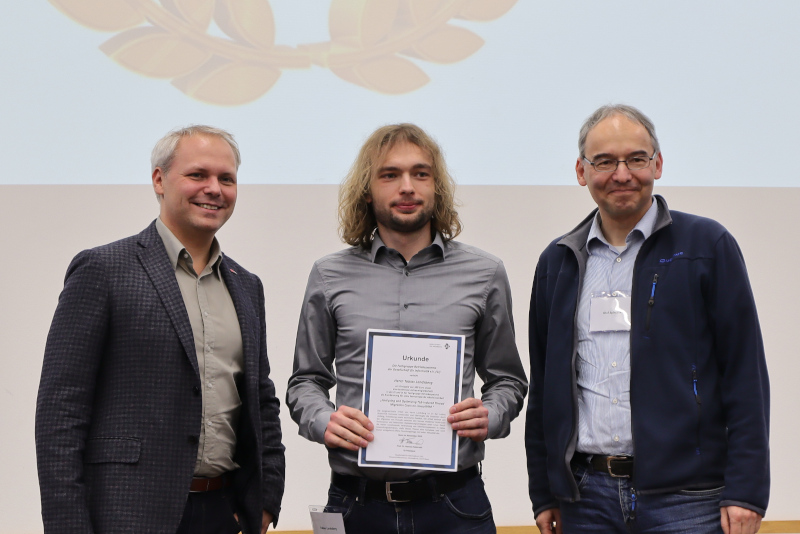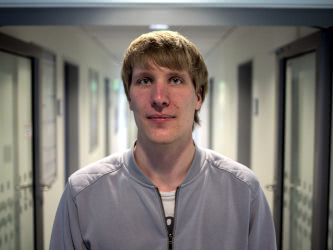AHA News And Trivia
Gerion Entrup presents our paper MultiSSE: Static Syscall Elision and Specialization for Event-Triggered Multi-Core RTOS at the 29th IEEE Real-Time and Embedded Technology and Applications Symposium (RTAS '23) in San Antonio, Tx, USA. In the paper we present MultiSSE, and extension of our SSE approach for RTOS-aware whole-program analyses to multi-core systems. Such systems are generally considered intractable for flow-sensitive analyses, as the number of possible system states rises exponentially with the number of cores. However, MultiSSE exploits structural and optional timing information to analyze the core-level control flows as independently as possible from each other, synchronizing their states only when necessary. Thereby, MultiSSE provides means to realize compile-time deadlock detection, lock elision and system-call optimization also on multi-core systems. This is an important building block for the AHA project.
Gerion Entrup presents our paper RTOS-Independent Interaction Analysis in ARA at the 16th Workshop on Operating System Platforms for Embedded Real-Time Applications (OSPERT '22) in Modena. In the paper we describe our approach towards RTOS-independent interaction analyses in the ARA framework that makes ARA analyses compatible with many RTOS standards, among them AUTOSAR OS, FreeRTOS and POSIX. The ARA OS model is an important building block towards our goal of fully automatic application analysis in the AHA project.
Björn Fiedler presents our paper ARA: Static Initialization of Dynamically-Created System Objects at the 27th IEEE Real-Time and Embedded Technology and Applications Symposium (RTAS '21).
In the paper, we present ARA, a framework for static specialization of operating systems for embedded systems. ARA is capable to statically detect operating-system objects dynamically created during run-time and replace them by statically prepared equivalents. ARA is a major building block of our reserch project AHA towards the goal to fully automatically analyze and specialize applications and their system software.
The presentation videos, source code and evaluation artifacts are available at the paper's details page: ARA: Static Initialization of Dynamically-Created System Objects
Tobias Landsberg receives the award for best master thesis in the field of operating systems. The award is granted annually by the SIG on Operating Systems of the German Computer Assiciation (GI Fachgruppe Betriebssysteme) solely on the base of scientific excellence. It includes a price money of 500 €. Congrats, Tobias!
In his thesis Analyzing and Optimizing TLB-Induced Thread Migration Costs on Linux/ARM Tobias evaluates if it is feasable and benefitial to pre-warm the TLB (Translation Look-Aside Buffer) when a thread is migrated to another core. He analyzes existing ARM cores, presents and evaluates possible hardware extensions in gem5 and and provides a complete Linux integration for the system.
Gerion Entrup presents our paper ARA: Automatic Instance-Level Analysis in Real-Time Systems at the 15th Workshop on Operating System Platforms for Embedded Real-Time Applications (OSPERT '19), in Stuttgart. In the paper we describe ARA, an analysis framework and tool to detect and visualize, how a given application employs RTOS abstractions. As a tool, ARA helps to understand how the tasks of an application given as source code interact which each other. The framework itself is an important building block towards our goal of fully automatic application analysis in the AHA project.
Björn Fiedler presents our paper Levels of Specialization in Real-Time Operating Systems was at the 14th Workshop on Operating System Platforms for Embedded Real-Time Applications (OSPERT '18), in Barcelona. In the paper we describe a taxonomy for the specialization of system software towards a specific application and provide showcases of the achievable benefits. We got an Best Paper Award for this work.
- AHA: Automated Hardware Abstraction in Operating-System Engineering (DFG: LO 1719/4-1)
- Goal of AHA is to improve nonfunctional properties of system software by a very deep, but fully automated specialization of the application-hardware bridge represented by the operating system. We investigate, how alternative implementations that are mapped more directly to hardware features, can be generated from a concrete application and their actual interactions with the operating system.






